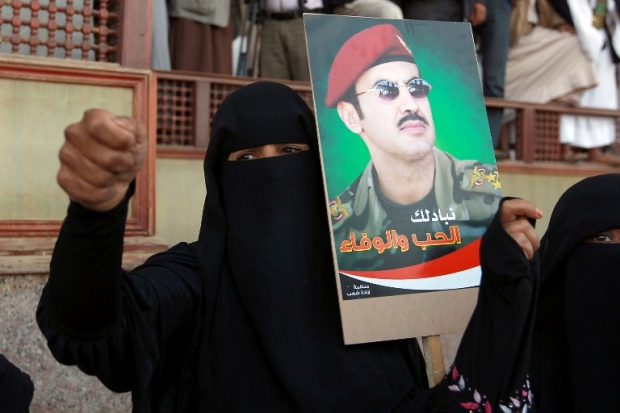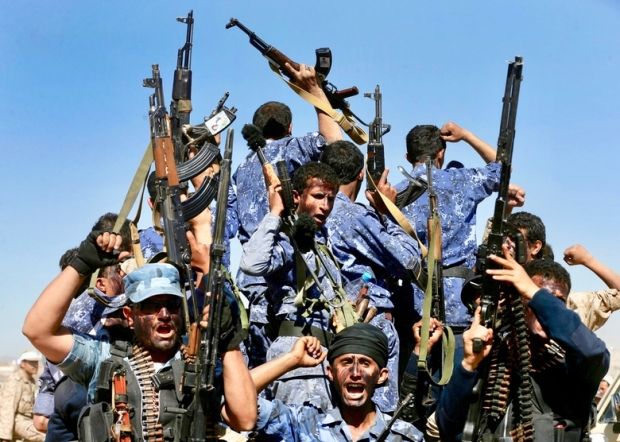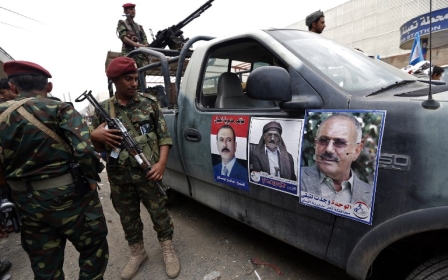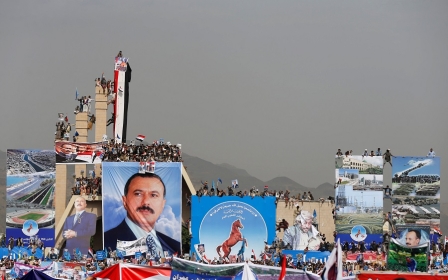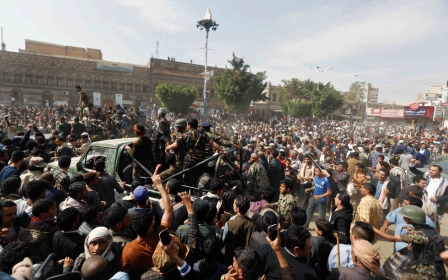Yemen war: Why Houthis and Saleh forces are trading insults and bullets
Leaders of the Houthi group and loyalists of former president Ali Abdullah Saleh, allies in Yemen’s civil war, said on Tuesday they had had agreed to ease tensions between them after several people were killed in a clash.
Violence late on Saturday between members of the Iran-aligned Houthis and Saleh loyalists marked a breakdown within the main political coalition fighting the Saudi-backed government of President Abd Rabbuh Mansour Hadi in the two-and-a-half-year-old conflict.
Aref al-Zouka, head of Saleh’s General People’s Congress (GPC), and the Houthi Ansarullah group’s official spokesman Mohammed Abdulsalam led delegations at a meeting in the Yemeni capital Sanaa late on Monday.
The meeting decided to “remove all causes of the tensions that occurred in the capital Sanaa and to return the security situation to what it was before the activities last week,” the two sides said in a statement.
Allies turned enemies
Houthi fighters and troops loyal to Saleh used to work side by side. Members of one group would never ask members of the other to show their ID cards.
Although two sides may be patching up relations, their fighters have lost trust in each other – and residents fear what may happen next in Yemen’s combustible and fragmented conflict, already halfway into its third year.
Late on Saturday, the convoy of Salah Saleh, son of the former president, was stopped by a Houthi checkpoint next to al-Misbahi roundabout in the Hadda neighborhood of Sanaa.
The immediate cause for the tension can be traced to a war of words which escalated between Ali Abdullah Saleh and the Houthis. On 21 August, the former president hinted that his allies were merely "a militia". The rebels retaliated by saying that the former president was a "backstabber" and "traitor" who would "bear the consequences" of the insult.
The next day Mohammed Ali al-Houthi, the president of the ruling Houthi-led Revolutionary Committee in Sanaa, demanded Saleh's party apologise to Ansarullah [the Houthis], but he did not say about what.
How alliance fell apart
The relationship was not always this strained: in 2014, an alliance of Saleh and the Houthis drove the Yemeni government out of Sanaa. The partnership since then has been tactical: the rebels can access Saleh's political power, while he benefits from their military clout.
But the alliance has floundered of late: the Houthis reportedly suspect Saleh of talking to the Saudi-led military coalition, which backs the former government, now based in Aden, while Saleh is perturbed at the Houthis' growing power in the capital, including control of some ministries.
On 24 August, Saleh exploited the 35th anniversary of the establishment of his General People's Congress (GPC) to show his support in Sanaa, causing the Houthis - who did not join in the celebrations - to believe that he now wants to go it alone. Then Abdul Malik al-Houthi, the leader of Ansarullah, gave a speech accusing the GPC of taking control of public institutions.
Al-Sofi said that four people were killed during the firefight, including Colonel Khalid al-Radhi, the deputy head of foreign relations for the GPC, who was shot in the head and heart by a sniper from behind. A further 10 people were injured.
Local news sites said that Al-Radhi was in the same car as Saleh’s son, who was reportedly injured, although this has not been confirmed. The GPC said in a statement on Sunday that al-Radhi was betrayed while returning home from work, but did not name the killers.
Ali al-Bokhaiti, a former leader of the Houthis who has had good relations with both sides in Yemen and abroad, said via Twitter that al-Radhi was killed after a mediation committee arrived and stopped the clashes. “A Houthi betrayed him [al-Radhi]. It is the militia of treachery and perfidy and all kinds of lowness."
'I hope all can behave calmly and commitment. The front is still priority for all'
- Mohammed Ali al-Houthi, president of Houthi Revolutionary Committee
He condemned the Houthis and called the setting up of checkpoints a form of banditry, allowing guards to act as if they were acting under the auspices of the interior ministry when they really wanted to provoke rivals.
For its part the Houthi-run Saba news agency said on Sunday that three Houthi soldiers had been killed. The interior ministry sent its condolences to their families but made no mention of al-Radhi, drawing accusations of bias from the GPC.
Mohammed Ali al-Houthi, the head of the Revolutionary Committee, said via his Facebook account on Saturday: "I hope all can behave calmly and with commitment. The front is still priority for all." The Houthi-Saleh Supreme Political Council, which controls the areas jointly run by the two sides, said after meeting on Sunday that "the consequences of Saturday’s clashes were contained and what happened was an accidental incident.”
A source in the interior ministry, which is under the control of the Houthis, told Middle East Eye on condition of anonymity that the clashes reflected less the attitudes of the two sides towards each other than tension between individual soldiers. “Irregularities like these have happened everywhere. We see daily clashes in the areas and the aggression [by coalition countries] in Aden and Taiz."
Residents: We fear what's coming
But this is of little comfort to the residents of Sanaa, who have seen a growing presence of military vehicles on their streets by both groups.
Ala'a al-Salami, who lives in Hadda and supports neither side, said the forces of Saleh had started to appear in his neighbourhood, where several GPC leaders live and work. Now residents are afraid they may see further clashes.
"The situation in Sanaa, especially where leaders live, is not safe at all, and residents have started to leave their houses, as they see military reinforcements arriving in their neighbourhoods,” he said
'The situation in Sana'a, especially where leaders live, is not safe at all, and residents have started to leave their houses, as they see military reinforcements arriving in their neighbourhoods'
- Ala'a al-Salami, resident
"The air strikes have not killed us yet, but instead we now fear we will be killed in clashes. Our only sin is that we cannot flee our country."
Other locals also fear for their welfare, avoiding walking near checkpoints or military barracks for their own safety.
Ibrahim al-Siragi, an independent political analyst based in the city, told MEE last week that Saleh had been in contact with the UAE, which is part of the anti-rebel coalition, during the last past two years and that his son Ahmed lives there. If the clashes continue, he said, then Saleh may be reconciled with the Saudi-led coalition.
But while the arrival of reinforcements was an important development, al-Siragi said, it does not mean the " beginning of a war between the two sides in Sanaa as it would serve neither set of interests, only allowing pro-government forces to defeat them on other fronts."
Sanaa may have suffered air strikes – an attack on the northern outskirts on 23 August left at least 35 people dead - but it has been calmer of late compared to Taiz and other provinces.
"The Houthis and Saleh will remain allies until a political solution ends the war - or at least halts the war and opens dialogue among Yemenis."
Middle East Eye propose une couverture et une analyse indépendantes et incomparables du Moyen-Orient, de l’Afrique du Nord et d’autres régions du monde. Pour en savoir plus sur la reprise de ce contenu et les frais qui s’appliquent, veuillez remplir ce formulaire [en anglais]. Pour en savoir plus sur MEE, cliquez ici [en anglais].


